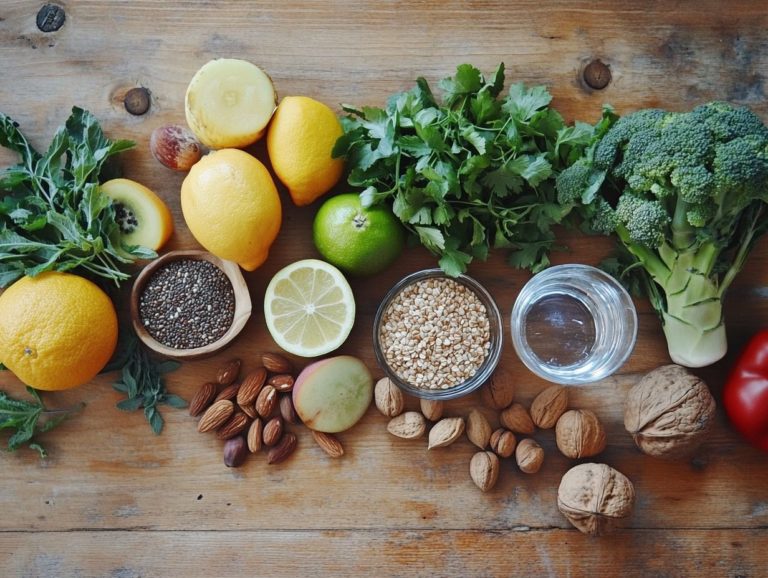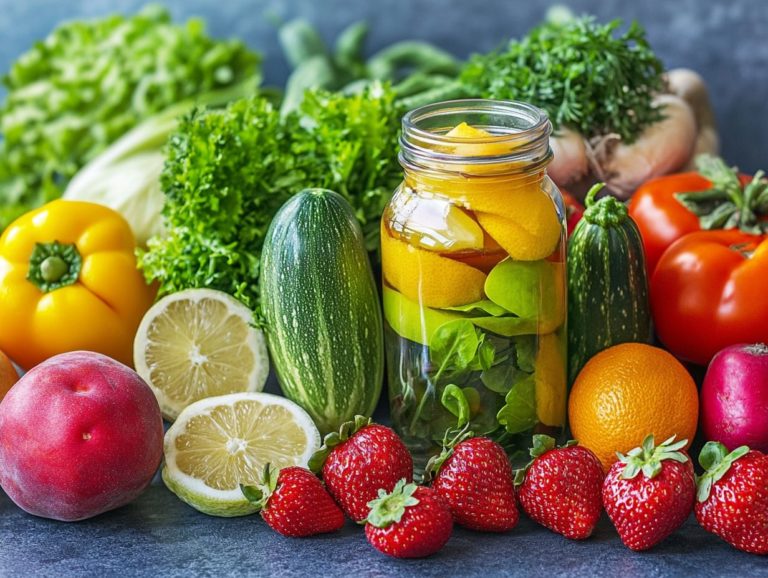10 Essential Herbs for Holistic Nutrition
Wellness trends change quickly. However, the wisdom of herbs remains a reliable ally in your health journey.
This article invites you to explore ten essential herbs, each celebrated for its remarkable health benefits think turmeric’s powerful anti-inflammatory properties and ashwagandha’s calming effects on stress.
You ll discover how these natural remedies can elevate your diet, support traditional medicine practices, and promote hormonal balance in your life.
Whether you seek to enhance digestion or lift your spirits, these herbs offer a treasure trove of holistic nutrition solutions just waiting for you to tap into.
Dive in and unlock the potential of nature’s bounty!
Contents
- Key Takeaways:
- 1. Turmeric: The Golden Spice for Inflammation
- 2. Ginger: A Powerful Digestive Aid
- 3. Cinnamon: A Delicious Blood Sugar Regulator
- 4. Ashwagandha: The Stress-Relieving Herb
- 5. Holy Basil: A Natural Adaptogen for Stress Management
- 6. Amla: The Vitamin C Powerhouse
- 7. Neem: A Bitter Herb for Skin and Blood Health
- 8. Brahmi: The Brain-Boosting Herb
- 9. Triphala: A Gentle Detoxifier
- 10. Shatavari: A Hormone-Balancing Herb for Women
- How Can These Herbs Be Incorporated into a Holistic Diet?
- Frequently Asked Questions
- What are the 10 essential herbs for holistic nutrition?
- Why are these herbs vital for holistic nutrition?
- How can you incorporate these herbs into a holistic nutrition diet?
- What are the specific health benefits of each of these 10 essential herbs?
- Are there any potential risks or side effects associated with these herbs?
- Can these herbs replace traditional medicine?
Key Takeaways:
- Turmeric is a powerful anti-inflammatory herb.
- Ginger is a potent digestive aid.
- Cinnamon helps regulate blood sugar levels.

1. Turmeric: The Golden Spice for Inflammation
Turmeric, often hailed as the golden spice, is revered for its stunning hue and remarkable medicinal properties. This powerhouse herb alleviates inflammation and various ailments, making it a critical component of herbal medicine and a go-to for those embracing natural remedies in country living.
Rich in curcumin, turmeric offers impressive anti-inflammatory effects that can be particularly advantageous for anyone dealing with conditions like arthritis or chronic pain. Incorporating this spice into your diet is a breeze; simply add it to soups, smoothies, or saut ed vegetables for inviting warmth.
Its antioxidant properties may also help enhance your overall health by combating oxidative stress. Research indicates that curcumin can help modulate inflammatory pathways in your body, providing a natural strategy for managing discomfort and promoting wellness.
By weaving this vibrant spice into your meals, you can start savoring its exquisite flavor and enjoy a multitude of health benefits.
2. Ginger: A Powerful Digestive Aid
Ginger is celebrated for its remarkable ability to support digestion and has been cherished in herbal medicine for centuries. Its myriad health benefits contribute significantly to your overall well-being.
The soothing properties of ginger are particularly effective for combating nausea, whether you re dealing with motion sickness, morning sickness during pregnancy, or post-operative discomfort.
Incorporating ginger into your daily routine can enhance digestion, leading to a more comfortable and efficient gastrointestinal experience.
Preparing a simple ginger tea is effortless: just steep fresh slices of ginger in hot water, allowing its natural oils and compounds to infuse the brew and create a fragrant elixir that warms your body.
For a refreshing twist, try a ginger-lemon infusion, merging the zesty flavor of lemon with ginger’s earthy notes. It transforms it into not just a remedy, but a delightful beverage.
3. Cinnamon: A Delicious Blood Sugar Regulator
Cinnamon is not just a delightful spice that elevates various dishes; it also serves as a natural remedy for regulating blood sugar levels. This makes it a favored ingredient among health enthusiasts and a staple in the world of herbal medicine.
Both health aficionados and chefs appreciate its versatility, incorporating it into everything from morning oatmeal to savory meat dishes. Research suggests that this remarkable spice can enhance insulin sensitivity, promoting better glucose control, particularly beneficial for those aiming to manage diabetes or maintain stable energy levels throughout the day.
Beyond culinary applications, cinnamon boasts a range of therapeutic advantages. It acts as a potent antioxidant and exhibits anti-inflammatory properties that can support overall well-being.
By simply sprinkling it into a smoothie or adding it to baked goods, you can seamlessly integrate cinnamon into your daily diet, inviting a wealth of health benefits with every flavorful bite.
4. Ashwagandha: The Stress-Relieving Herb
Ashwagandha is a stress-relieving herb celebrated for its remarkable ability to alleviate stress. It is an invaluable ally in your pursuit of natural remedies and holistic health solutions through herbal medicine.
Its compounds help balance cortisol, the stress hormone. This promotes calmness and overall well-being.
But the benefits don’t stop at stress relief! It can also enhance your mental clarity, improve sleep quality, and even boost your physical stamina.
Incorporating this powerful herb into your daily routine is a breeze. You can enjoy adding ashwagandha powder to your morning smoothies, oatmeal, or herbal teas it blends seamlessly into your meals!
If you re on the go, capsules or tinctures provide a convenient option. This allows you to harness both mental and physical health benefits without any fuss.
5. Holy Basil: A Natural Adaptogen for Stress Management
Holy basil, often called Tulsi, is a revered herb known for its remarkable ability to manage stress. It serves as a guiding light for those navigating the complexities of modern life and seeking holistic health solutions through herbal medicine.
This extraordinary herb helps balance stress hormones and supports your immune system. Many health practitioners advocate for incorporating holy basil into your daily routine whether through calming teas or potent tinctures.
To prepare a revitalizing holy basil tea, simply steep fresh or dried leaves in hot water for about 10 minutes. Let the soothing aroma clear your mind!
You might also consider blending the leaves into smoothies or incorporating them into your culinary creations. This makes stress relief not just effective, but a deliciously enjoyable part of your day!
6. Amla: The Vitamin C Powerhouse
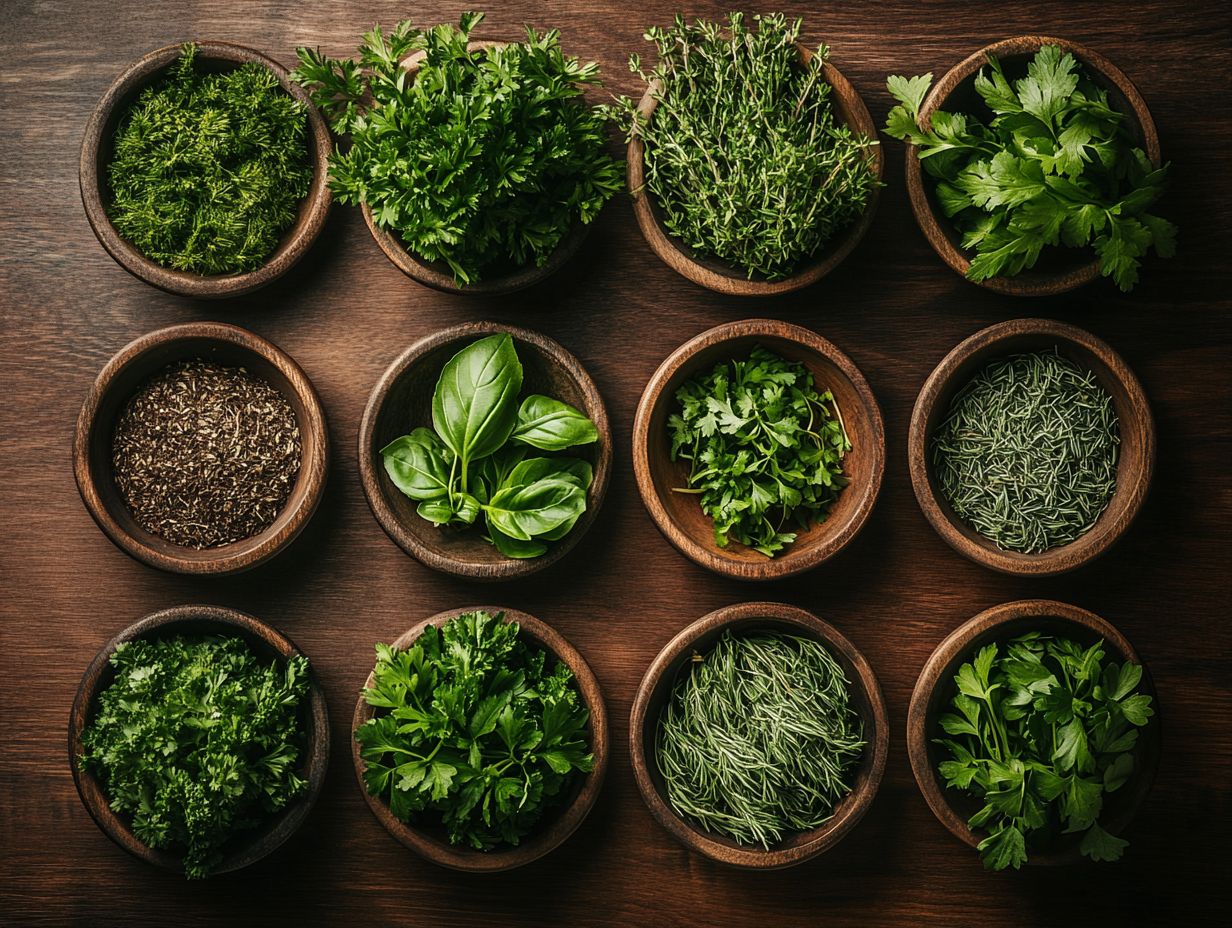
Amla is a true powerhouse of vitamin C and a remarkable natural remedy. It bolsters your immunity and fosters overall wellness, making it a critical element of herbal medicine and country living.
This small green fruit is teeming with antioxidants that combat free radicals, which can lead to various health issues. By incorporating amla into your daily routine, you can significantly enhance your body’s defenses against common ailments, particularly during flu season!
Its anti-inflammatory properties also promote vibrant skin health, helping to reduce blemishes and signs of aging. Want to know how to use Amla? Consider indulging in delightful recipes like:
- An energizing amla smoothie blended with yogurt and honey!
- A refreshing amla and mint chutney that elevates any meal while nourishing your body from within!
7. Neem: A Bitter Herb for Skin and Blood Health
Neem, often viewed as a bitter herb, is a treasure trove of benefits for both skin and blood health. It stands out as a crucial element in herbal medicine and is a popular choice for those venturing into the world of natural remedies.
This remarkable plant boasts powerful antibacterial and anti-inflammatory properties. It is particularly effective in tackling skin conditions such as acne, eczema, and psoriasis!
By embracing the benefits of neem, you can achieve clearer skin by incorporating neem oil or crushed leaves into your daily skincare routine.
Want clearer skin? Try making a paste from fresh neem leaves and apply it to problem areas. For blood-related issues, like poor circulation or hypertension, a soothing neem-infused tea can be incredibly beneficial.
To prepare it, steep neem leaves in hot water for several minutes. Savor the drink to help purify your blood and enhance your overall well-being!
Explore the benefits of these herbs today and transform your health!
8. Brahmi: The Brain-Boosting Herb
Brahmi stands out as a remarkable brain-boosting herb, known for its ability to enhance cognitive function and memory. This makes it an essential component of herbal medicine, offering a wealth of health benefits.
Its ability to improve mental clarity makes it a favorite among educators, students, and anyone engaged in rigorous intellectual pursuits. You can often find brahmi in various herbal preparations teas, capsules, and tinctures making it easy to integrate into your daily routine.
By promoting neuronal health and circulation, it helps you maintain focus and sharpness throughout the day.
Looking for a natural way to reduce stress? Try brahmi! You might find that brahmi offers a calming effect, further enhancing your mental acuity and contributing to your overall emotional well-being.
9. Triphala: A Gentle Detoxifier
Triphala is a known herbal formulation, revered for its gentle detoxification properties. It is a great natural option for enhancing digestive health and overall well-being in the realm of herbal medicine.
This ancient blend, composed of three potent fruits amalaki, bibhitaki, and haritaki works harmoniously to cleanse your digestive tract while providing essential nutrients that support gut flora and improve nutrient absorption.
By incorporating it into your routine, you may experience enhanced bowel regularity and reduced bloating, fostering a balanced digestive system.
If you re considering adding triphala to your holistic health regimen, it s easy to take. You can mix the powder with warm water or steep it as a tea, promoting digestive harmony and serving as a gentle detoxifier to eliminate accumulated toxins from your body.
This trusted herbal remedy can help you feel revitalized and improve your vitality.
10. Shatavari: A Hormone-Balancing Herb for Women
Shatavari is a revered herb, known for its hormone-balancing properties, especially in women’s health. It stands as a cornerstone in herbal medicine and serves as a natural remedy to enhance overall wellness.
This herb helps your body adapt to stress and not only supports reproductive health but also helps you manage the symptoms associated with hormonal fluctuations, such as mood swings and irregular cycles. You’ll find that shatavari can significantly nourish your body, boost fertility, and enhance lactation.
Incorporating shatavari into your daily routine is simple and rewarding. Consider adding its powder to your smoothies or oatmeal for a nourishing boost.
Alternatively, brew it as a soothing tea with warm milk and honey, transforming it into a delightful, healthful beverage. For added convenience, you might even explore shatavari capsules, ensuring you effortlessly receive its many benefits.
How Can These Herbs Be Incorporated into a Holistic Diet?
Try adding these herbs to your meals to enhance flavor while maximizing the incredible health benefits stemming from their medicinal properties. For instance, exploring the top 5 herbs for cooking and health can help you embrace natural remedies, promoting both personal independence and well-being.
As you experiment with these aromatic additions, you’ll elevate your everyday meals and uncover the joys of healthy cooking. For example, fresh basil can be transformed into a vibrant pesto or sprinkled over salads for that extra burst of zest.
Chamomile can be steeped to create a soothing herbal tea, ideal for winding down your evenings. Including ginger in your stir-fries or soups not only adds warmth but also aids digestion.
These practices do more than create delicious dishes; they harness the power of nature s finest healers, giving you the power to take charge of your health through simple, everyday choices.
Start incorporating these powerful herbs into your life today for a healthier you!
What Are the Benefits of Using Herbs for Nutrition?
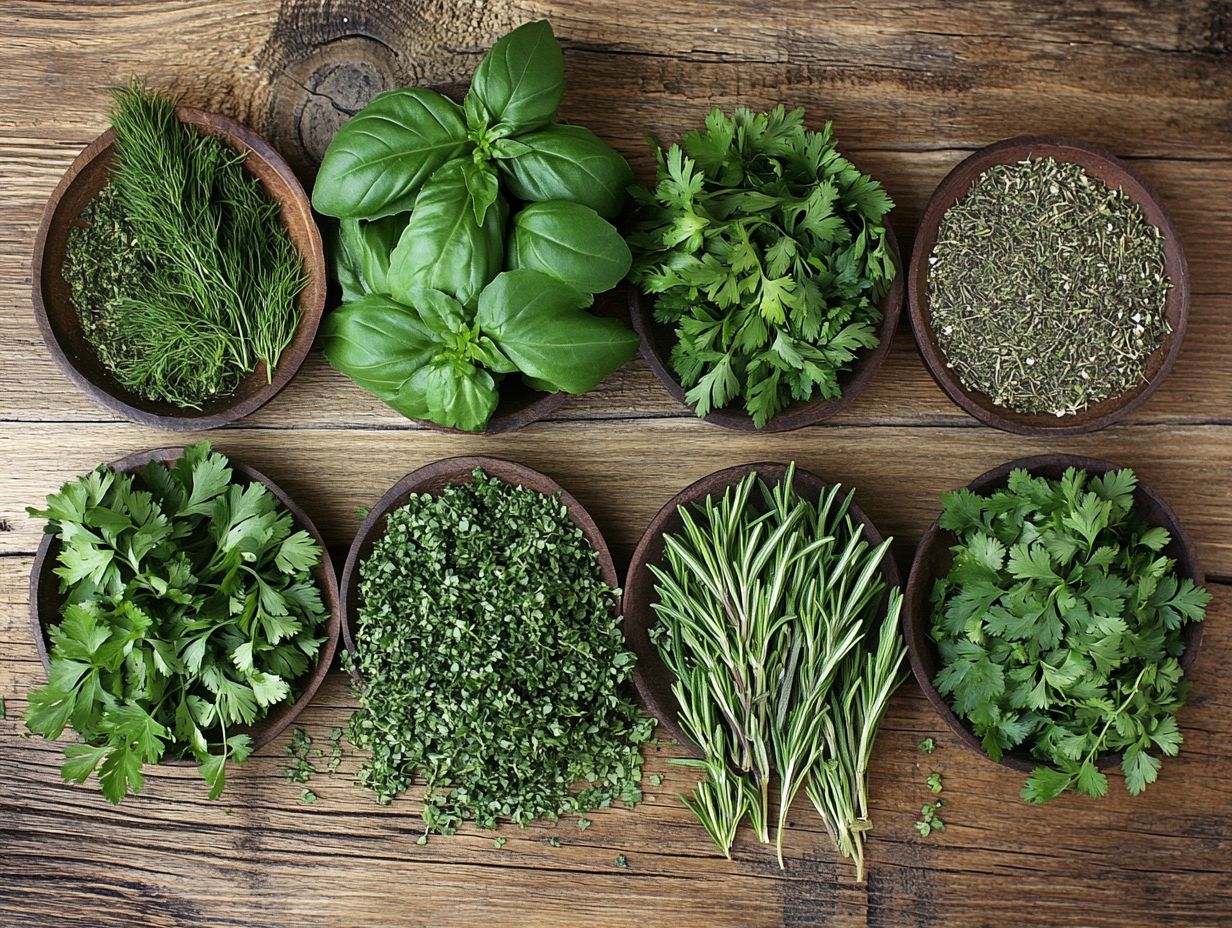
Using herbs for nutrition unlocks amazing health benefits that can transform your meals and well-being! 5 must-have herbs for herbalists enhance the flavor of your meals while providing significant medicinal properties that support your overall health.
Among the vast selection of herbs, turmeric truly shines. Its powerful properties help reduce swelling and pain, making it a favored option for anyone seeking relief from joint pain or chronic inflammation.
Ginger works wonders for digestive health, known for its soothing effects on upset stomachs and its ability to reduce nausea.
Herbs like oregano and thyme are packed with antioxidants that boost your immune system, helping you fend off illness more effectively.
By incorporating these herbs into your routine, you not only elevate the taste of your dishes but also embrace a holistic approach to health. For example, you might try 5 simple recipes for holistic nutrition that let you harness nature’s gifts for a better quality of life.
How Can These Herbs Be Used in Traditional Medicine Practices?
These herbs have been cherished in traditional medicine for centuries. They offer invaluable health benefits and serve as natural remedies for a variety of ailments.
From ancient Ayurvedic practices in India to the philosophies of traditional Chinese medicine, these natural remedies have gained respect for their remarkable healing properties across cultures.
Ancient texts and oral traditions emphasize the significance of herbs like turmeric and ginger, which blend seamlessly into both culinary delights and medicinal applications.
In today’s world, modern herbal practices embrace these time-honored herbs, weaving them into wellness routines and highlighting their potential to promote holistic health through the top 10 kitchen herbs and their benefits.
As diverse societies rediscover these ancestral practices, incorporating herbs into contemporary health regimens underscores their vital role in your quest for natural and effective treatments.
What Are the Potential Side Effects of Using These Herbs?
While you may appreciate the numerous health benefits that herbs offer, it’s essential to remain mindful of potential side effects that may arise from their use. This awareness ensures that herbal medicine remains a safe and effective option among natural remedies.
For instance, herbs like St. John’s Wort can interact with various medications, leading to unintended consequences such as diminished efficacy of antidepressants. Ginseng might cause insomnia or digestive issues.
It’s crucial for anyone considering these herbal treatments to consult with healthcare providers. This helps tailor their approach to their specific health needs and understand potential interactions.
By following safety guidelines, such as adhering to recommended dosages and exercising caution with long-term use, you can mitigate risks and enhance the overall effectiveness of your herbal supplementation.
How Can One Determine the Right Dosage for These Herbs?
Determining the right dosage for these herbs is crucial for maximizing their health benefits while minimizing the risk of adverse effects. This is a key consideration in your practice of herbal medicine.
Approach this with thorough research and a personalized understanding of your unique health needs. Factors such as your age, weight, existing health conditions, and any medications you’re currently taking significantly influence how different herbs may affect you.
Consulting with healthcare professionals or utilizing reputable resources can guide you in establishing an effective and safe dosage.
It’s essential to remember that what works for one person may not yield the same results for another. This highlights the importance of tailored recommendations in the realm of herbal supplements.
Conclusion
In summary, incorporating herbs into your nutrition can lead to transformative health benefits. From boosting your immune system to aiding digestion, these natural remedies, including herbs used in naturopathy for healing, offer a holistic approach to well-being. Always consult with healthcare professionals and explore the exciting world of herbs to enhance your health journey!
What Are the Common Myths About Using Herbs for Nutrition?
Many people misunderstand herbs for nutrition. This confusion overshadows their real health benefits and effectiveness as natural remedies.
Some people view herbs only as flavor enhancers. They overlook the remarkable healing properties these plants offer.
Knowing how these herbs work is important. With accurate information, you can confidently incorporate natural remedies into your routine, maximizing their benefits while minimizing side effects.
Frequently Asked Questions
What are the 10 essential herbs for holistic nutrition?
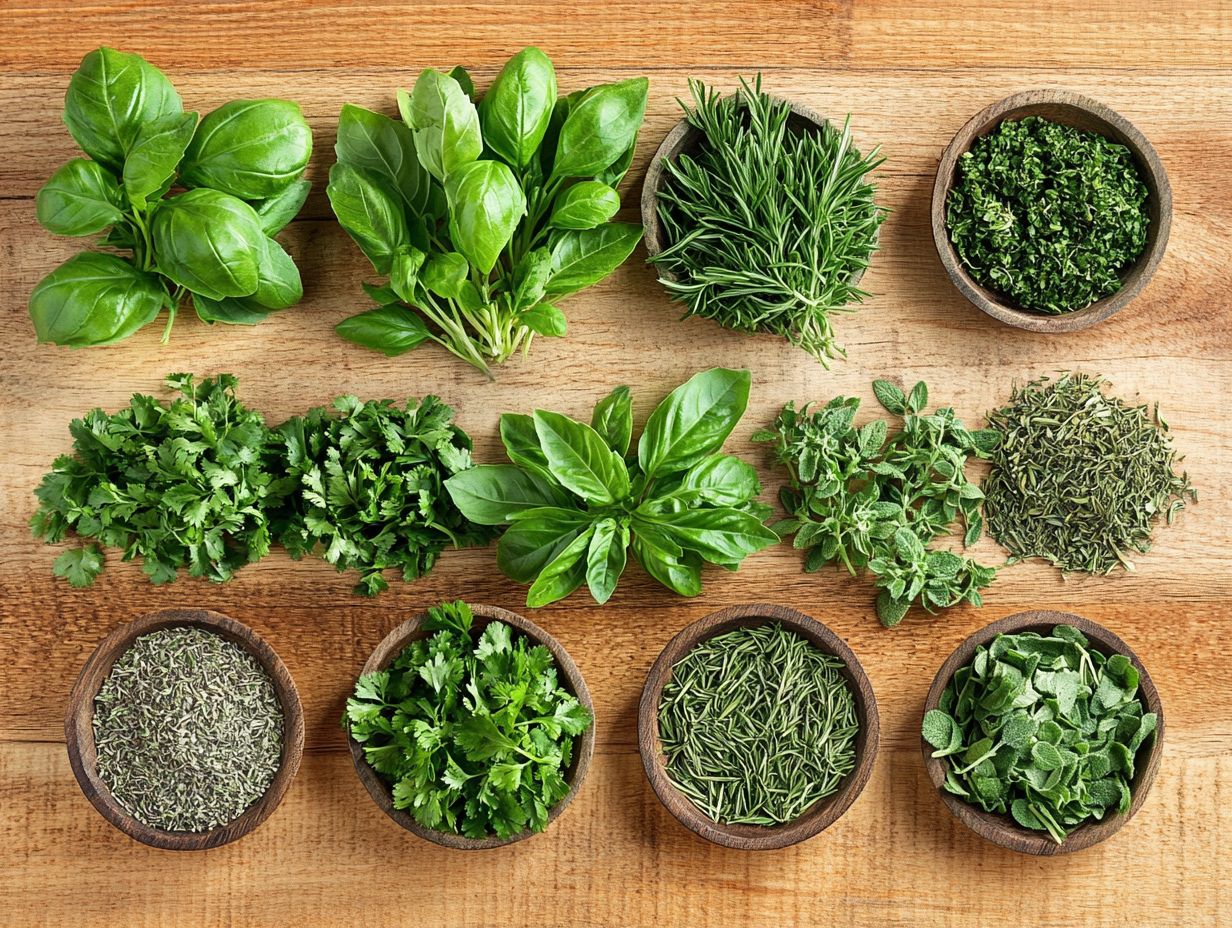
The 10 essential herbs for holistic nutrition include turmeric, ginger, garlic, cinnamon, cayenne pepper, rosemary, thyme, oregano, sage, and basil, which are also highlighted in 10 herbs for integrative health practices.
Why are these herbs vital for holistic nutrition?
These herbs are vital! They are packed with nutrients and have a wide range of medicinal properties that promote overall health and wellness, making them a great addition to healthy snacks for holistic nutrition.
How can you incorporate these herbs into a holistic nutrition diet?
You can easily add these herbs to your meals. Consider making herbal teas, using them as spices, or taking them in supplement form.
What are the specific health benefits of each of these 10 essential herbs?
Turmeric is anti-inflammatory and aids digestion. Ginger supports immune function and relieves nausea.
Garlic has antibacterial and antiviral properties. Cinnamon helps regulate blood sugar levels.
Cayenne pepper boosts metabolism. Rosemary improves memory and concentration.
Thyme has antimicrobial properties. Oregano is high in antioxidants.
Sage supports brain function and boosts mood. Basil has anti-inflammatory and anti-cancer properties.
Are there any potential risks or side effects associated with these herbs?
While these herbs are generally safe, they may interact with certain medications or affect individuals with specific health conditions. Always consult a healthcare professional before adding new herbs to your diet.
Can these herbs replace traditional medicine?
These herbs should not replace traditional medicine. They can support your health but any medical concerns should be discussed with a healthcare professional.

